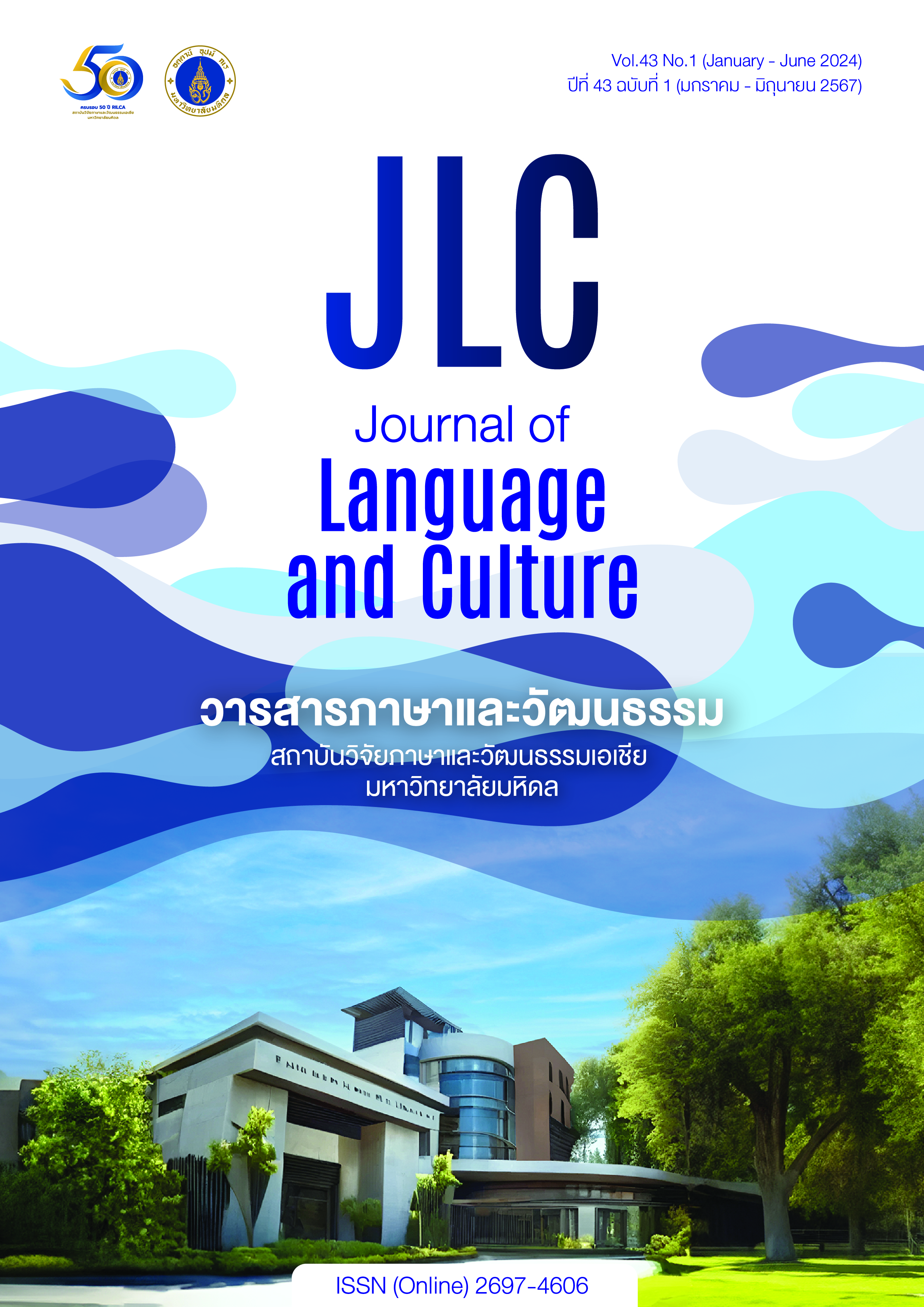Villainized subjects in the first-wave COVID-19 crisis in English online news in Thailand
Main Article Content
Abstract
This paper discusses the narrative construction of “villains'' in COVID-19 Thai online news, proposing that media portrayals of subjects related to COVID-19 were negatively framed as villains through narrative framing and biased characterization. A close critical reading method, aided by Vladimir Propp’s narratological model and Michel Foucault’s theoretical conceptions of power and knowledge, is used in the analysis of the texts. The article includes the definition of ‘villains’, the villainization process, and the villainized subjects in COVID-19 English online news during the first wave crisis in Thailand in the first half of 2020. By doing so, this paper aims to provide a clearer understanding of past perspectives on the pandemic and its moral repercussions for Thai society in order to strengthen communication and response strategies when interacting with COVID-19 subjects and victims of future pandemics.
Article Details

This work is licensed under a Creative Commons Attribution 4.0 International License.
The articles featured in the Journal of Language and Culture (JLC) constitute academic works representing the viewpoints of the respective author(s). It is crucial to note that these opinions do not necessarily reflect those of the Editorial Board.
All articles published in JLC are released under the Creative Commons Attribution 4.0 International License (CC BY 4.0). This license grants permission for unrestricted use, distribution, and reproduction in any medium, provided proper credit is given to the original author(s) and the source.
References
Achakulwisut, A. (2020, May 19). “Ugly” pantry scenes expose a nation divided. Bangkok Post. https://www.bangkokpost.com/opinion/opinion/1920460/ugly-pantry-scenes-expose-a-nation-divided
AFP. (2020, March 17). US, China play coronavirus blame game. Bangkok Post. https://www.bangkokpost.com/world/1880495/us-china-play-coronavirus-blame-game
Bangkok Post. (2020, April 5). Roundup of airport escapees begins. Bangkok Post. https://www.bangkokpost.com/thailand/general/1893155/roundup-of-airport-escapees-begins
Batova, T. (2021). “Picturing” Xenophobia: Visual Framing of Masks During COVID-19 and Its Implications for Advocacy in Technical Communication. Journal of Business and Technical Communication, 35(1), 50–56. https://doi.org/10.1177/1050651920958501
Bloomberg News. (2020, January 30). Chinese no longer welcome as Coronavirus Fear Grips World. Bangkok Post. Bangkok Post. https://www.bangkokpost.com/world/1846959/chinese-no-longer-welcome-as-coronavirus-fear-grips-world
Bunnag, O., & Chaemsaithong, K. (2024). Negotiating trust through COVID-19 press briefings: A multimodal analysis. https://doi.org/10.1075/jlp.23090.bun
Dionne, K. Y., & Turkmen, F. F. (2020). The Politics of Pandemic Othering: Putting COVID-19 in Global and Historical Context. International Organization, 74(S1), E213–E230. https://doi.org/10.1017/S0020818320000405
Doungphummes, N., Saeheng, J., & Phanthaphoommee, N. (2023). Crisis as a Trigger for the Reproduction of Otherness: The Never-ending Discrimination Against Myanmar Workers in Thai Society. Journal of Mekong Societies, 19(3), Article 3. https://so03.tci-thaijo.org/index.php/mekongjournal/article/view/266201
Editorial. (2020, March 5). Challenge of contagion. Bangkok Post. https://www.bangkokpost.com/thailand/general/1871624/every-phi-noi-from-s-korea-to-be-isolated
Foucault, M., & Rabinow, P. (1984). The Foucault reader (1st ed). Pantheon Books.
Heit, J. (Ed.). (2011). Vader, Voldemort and other villains: Essays on Evil in Popular Media. McFarland.
Jawaharlal Nehru University, & Dogra, S. (2017). The Thirty-One Functions in Vladimir Propp’s Morphology of the Folktale: An Outline and Recent Trends in the Applicability of the Proppian Taxonomic Model. Rupkatha Journal on Interdisciplinary Studies in Humanities, 9(2). https://doi.org/10.21659/rupkatha.v9n2.41
Kjeldgaard-Christiansen, J. (2019). A Structure of Antipathy. Projections, 13(1), 67–90. https://doi.org/10.3167/proj.2019.130105
Lahlou, K. (2017). An Attempt at Applying Vladimir Propp’s Morphology of the Folktale on Charles Dickens’s Great Expectations. Arab World English Journal For Translation and Literary Studies, 1(3), 106–120. https://doi.org/10.24093/awejtls/vol1no3.8
Lin, Y., Kingminghae, W., & Mahasirithai, P. (2021). Brothers or “Others”? Attitudes of Thais Towards Chinese Tourists during COVID-19. Journal of China Tourism Research. https://www.tandfonline.com/doi/abs/10.1080/19388160.2021.1948481
Mathayomchan, B., Taecharungroj, V., & Wattanacharoensil, W. (2023). Evolution of COVID-19 tweets about Southeast Asian Countries: Topic modelling and sentiment analyses. Place Branding and Public Diplomacy, 19(3), 317–334. https://doi.org/10.1057/s41254-022-00271-5
Post Reporters. (2020a, March 4). “Little ghosts” spark virus fears. Bangkok Post. https://www.bangkokpost.com/thailand/general/1870819/little-ghosts-spark-virus-fears
Post Reporters. (2020b, May 13). Prayut lashes out at pantry raiders for abusing goodwill. Bangkok Post.
Propp, V. J., & Pírková-Jakobsonová, S. (2015). Morphology of the folktale (L. Scott, Trans.). Mansfield Centre, CT.
Pupattanapong, C. (n.d.). 30 teens held at birthday party. Bangkok Post. https://www.bangkokpost.com/thailand/general/1926760/30-teens-held-at-birthday-party
Rajatanavin, N., Tuangratananon, T., Suphanchaimat, R., & Tangcharoensathien, V. (2021). Responding to the COVID-19 second wave in Thailand by diversifying and adapting lessons from the first wave. BMJ Global Health, 6(7), e006178. https://doi.org/10.1136/bmjgh-2021-006178
Ruiz-Montero, C. (1981). The Structural Pattern of the Ancient Greek Romances and the Morphology of the Folktale of V. Propp. Fabula, 22 (Jahresband), 228–238. https://doi.org/10.1515/fabl.1981.22.1.228
Suwanwattana, W. (2022). Prophylactic Nationalism: COVID-19 in Thai Public Health Discourse. In The Languages of COVID-19. Routledge.
The Nation. (2020a, March 6). ‘Little ghost’ gets Chiang Mai spooked. The Nation Thailand. https://www.nationthailand.com/in-focus/30383520
The Nation. (2020b, March 20). Up to 500 boxing fans could be infected, undetected. The Nation Thailand. https://www.nationthailand.com/in-focus/30384508
The Nation. (2020c, May 11). Fierce Internet debate after Ubon Ratchathani family empties pantry meant for needy. The Nation Thailand. https://www.nationthailand.com/in-focus/30387647
The Nation. (2020d, May 20). Youngsters land in hot soup over ‘fun.’ The Nation Thailand. https://www.nationthailand.com/in-focus/30388201
Tiffany, K. (2020, May 6). How ‘Karen’ Became a Coronavirus Villain. The Atlantic. https://www.theatlantic.com/technology/archive/2020/05/coronavirus-karen-memes-reddit-twitter-carolyn-goodman/611104/
Viala-Gaudefroy, J., & Lindaman, D. (2020, April 22). Donald Trump’s ‘Chinese virus’: The politics of naming. The Conversation. https://theconversation.com/donald-trumps-chinese-virus-the-politics-of-naming-136796


